Ethical Considerations and Business Objectives: Volkswagen Report
VerifiedAdded on 2020/06/04
|15
|4512
|140
Report
AI Summary
This report provides a comprehensive analysis of the business ethics of Volkswagen, examining various theoretical ethical approaches, including deontological, teleological, utilitarian, and ethical egoism. It delves into the comparison and contrast of absolute and relative ethics, providing a framework for understanding ethical decision-making. The report identifies and discusses several ethical issues impacting Volkswagen's operational activities, such as deceiving consumers, deceptive advertising, the use of technology to mislead, and a lack of environmental concern. Furthermore, the report explores how ethical considerations affect Volkswagen's business objectives, including employee migration and decreased demand due to ethical violations. The report also considers the role of the company as a moral agent and suggests mechanisms for improving employee involvement and empowerment. Finally, the report addresses a current ethical issue affecting the company, suggesting ways to improve ethical operations and the design of an ethical code. The Volkswagen case study provides valuable insights into ethical challenges faced by businesses and the importance of ethical conduct in achieving long-term success.
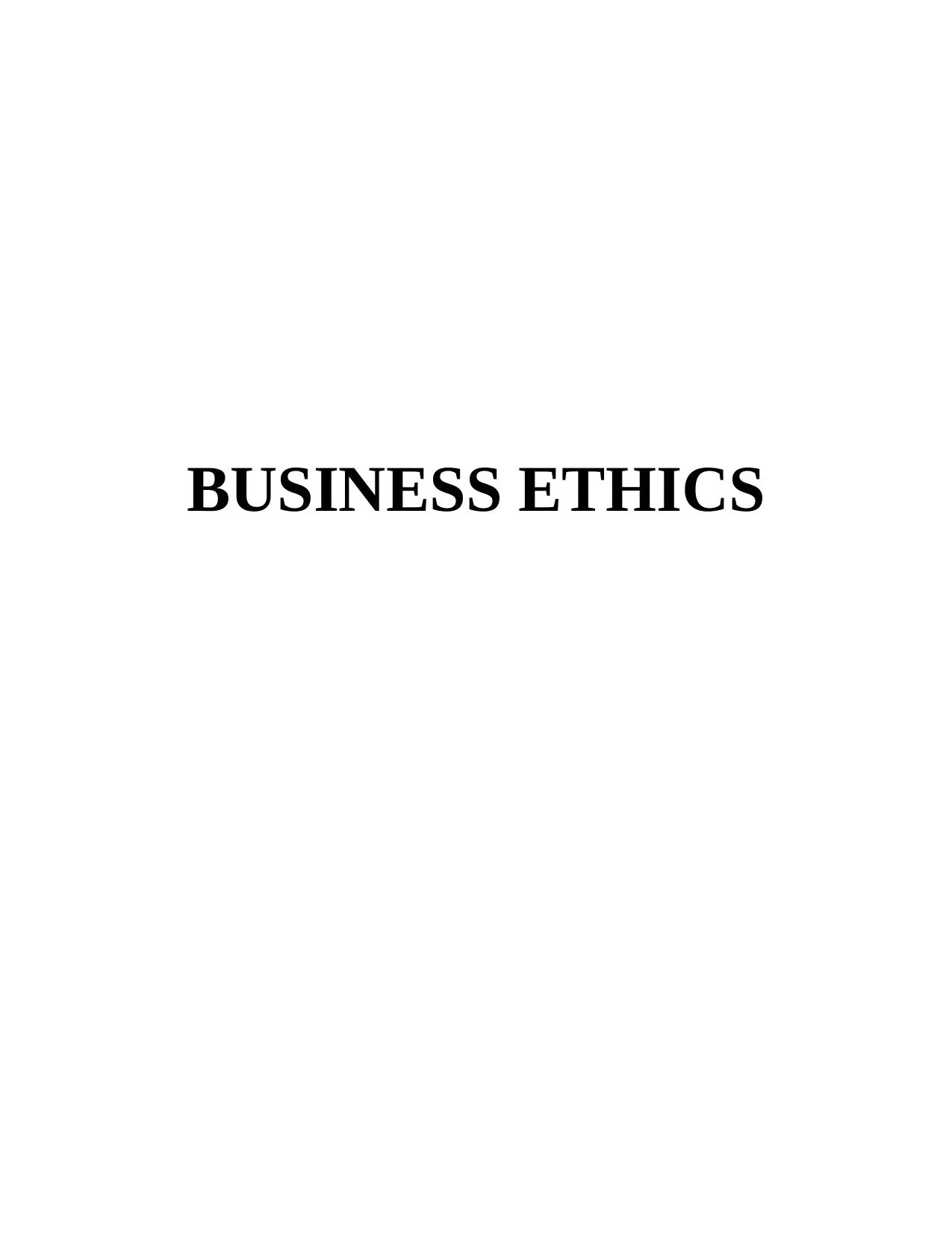
BUSINESS ETHICS
Paraphrase This Document
Need a fresh take? Get an instant paraphrase of this document with our AI Paraphraser
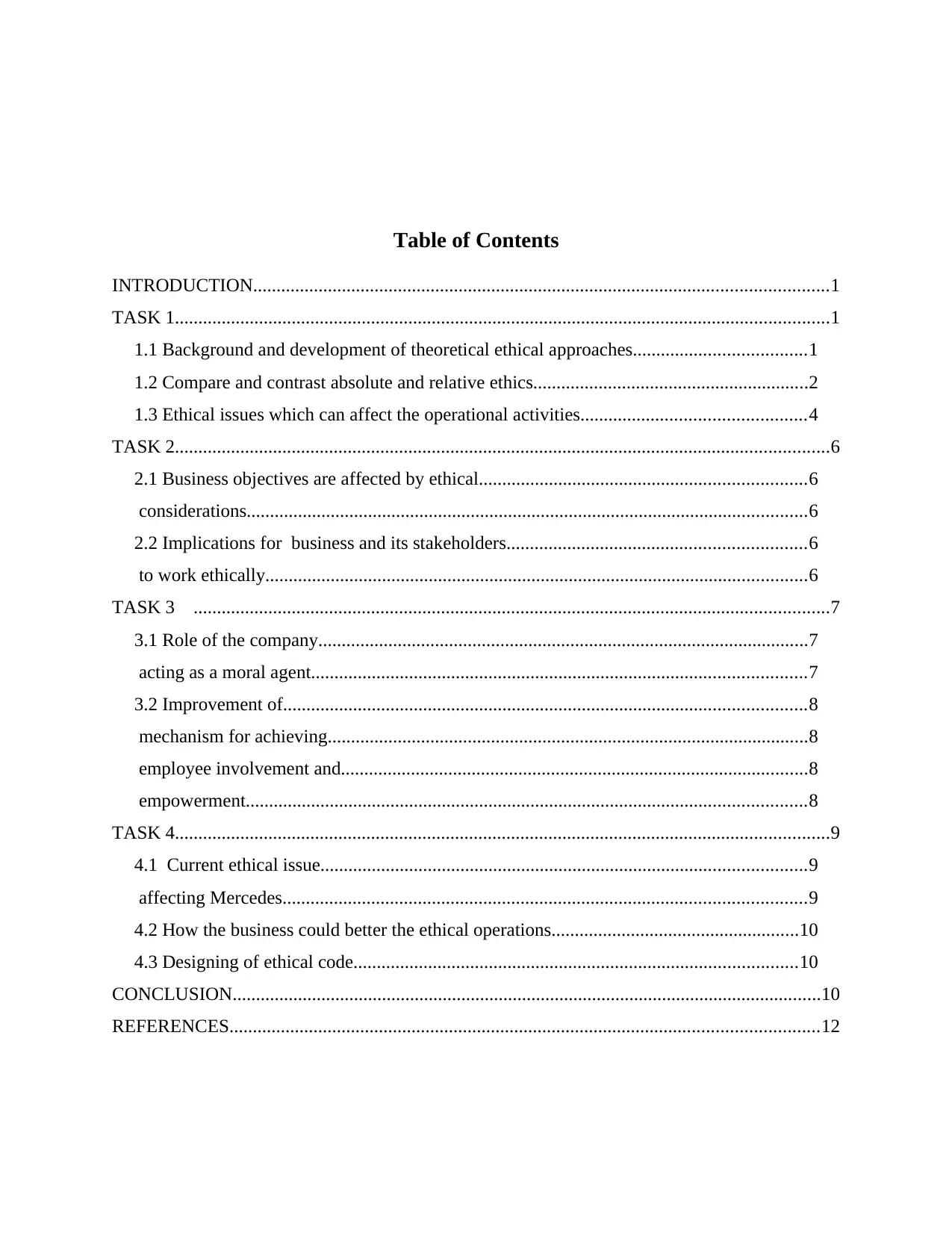
Table of Contents
INTRODUCTION...........................................................................................................................1
TASK 1............................................................................................................................................1
1.1 Background and development of theoretical ethical approaches.....................................1
1.2 Compare and contrast absolute and relative ethics...........................................................2
1.3 Ethical issues which can affect the operational activities................................................4
TASK 2............................................................................................................................................6
2.1 Business objectives are affected by ethical......................................................................6
considerations........................................................................................................................6
2.2 Implications for business and its stakeholders................................................................6
to work ethically....................................................................................................................6
TASK 3 ........................................................................................................................................7
3.1 Role of the company.........................................................................................................7
acting as a moral agent..........................................................................................................7
3.2 Improvement of................................................................................................................8
mechanism for achieving.......................................................................................................8
employee involvement and....................................................................................................8
empowerment........................................................................................................................8
TASK 4............................................................................................................................................9
4.1 Current ethical issue........................................................................................................9
affecting Mercedes................................................................................................................9
4.2 How the business could better the ethical operations.....................................................10
4.3 Designing of ethical code...............................................................................................10
CONCLUSION..............................................................................................................................10
REFERENCES..............................................................................................................................12
INTRODUCTION...........................................................................................................................1
TASK 1............................................................................................................................................1
1.1 Background and development of theoretical ethical approaches.....................................1
1.2 Compare and contrast absolute and relative ethics...........................................................2
1.3 Ethical issues which can affect the operational activities................................................4
TASK 2............................................................................................................................................6
2.1 Business objectives are affected by ethical......................................................................6
considerations........................................................................................................................6
2.2 Implications for business and its stakeholders................................................................6
to work ethically....................................................................................................................6
TASK 3 ........................................................................................................................................7
3.1 Role of the company.........................................................................................................7
acting as a moral agent..........................................................................................................7
3.2 Improvement of................................................................................................................8
mechanism for achieving.......................................................................................................8
employee involvement and....................................................................................................8
empowerment........................................................................................................................8
TASK 4............................................................................................................................................9
4.1 Current ethical issue........................................................................................................9
affecting Mercedes................................................................................................................9
4.2 How the business could better the ethical operations.....................................................10
4.3 Designing of ethical code...............................................................................................10
CONCLUSION..............................................................................................................................10
REFERENCES..............................................................................................................................12

⊘ This is a preview!⊘
Do you want full access?
Subscribe today to unlock all pages.

Trusted by 1+ million students worldwide
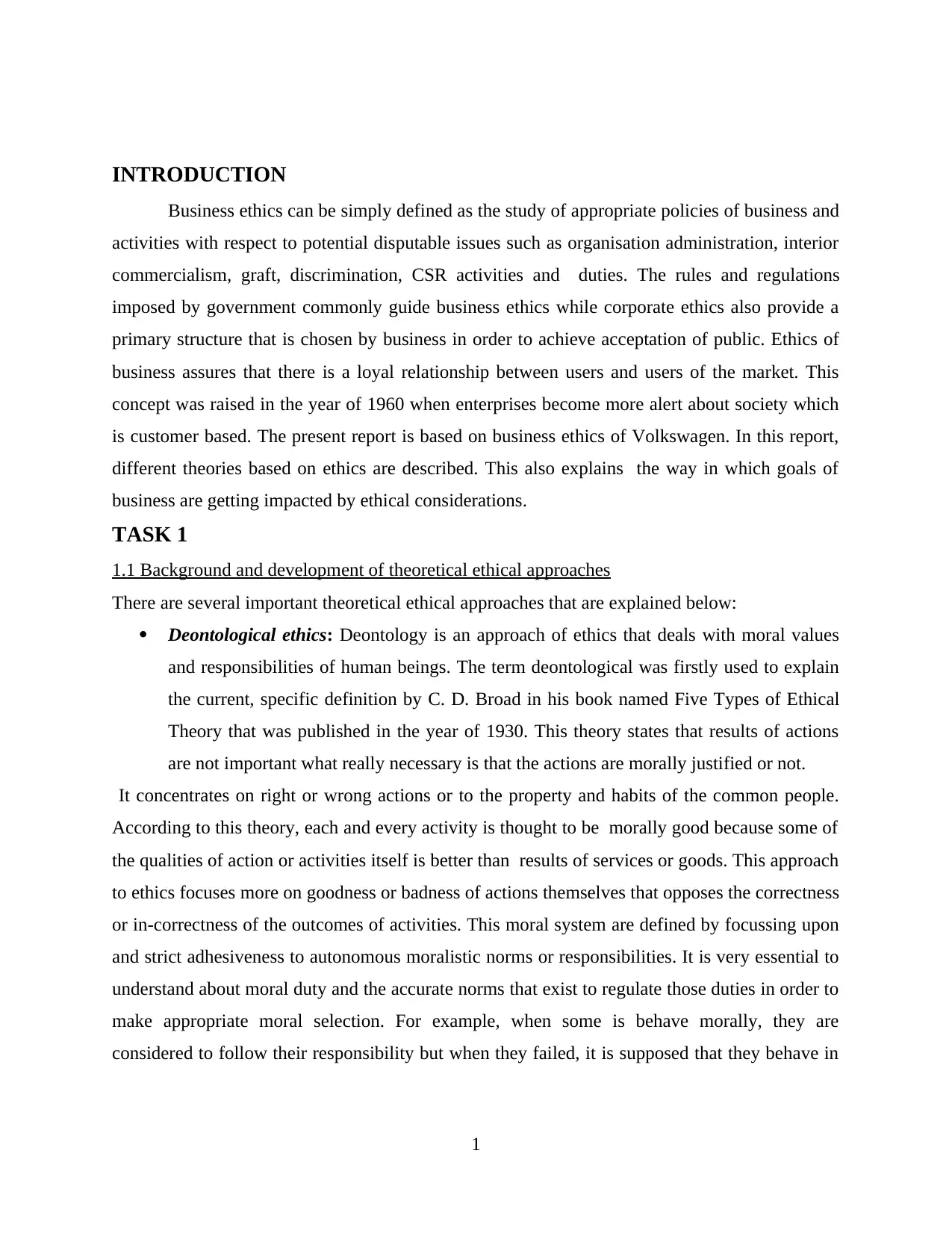
INTRODUCTION
Business ethics can be simply defined as the study of appropriate policies of business and
activities with respect to potential disputable issues such as organisation administration, interior
commercialism, graft, discrimination, CSR activities and duties. The rules and regulations
imposed by government commonly guide business ethics while corporate ethics also provide a
primary structure that is chosen by business in order to achieve acceptation of public. Ethics of
business assures that there is a loyal relationship between users and users of the market. This
concept was raised in the year of 1960 when enterprises become more alert about society which
is customer based. The present report is based on business ethics of Volkswagen. In this report,
different theories based on ethics are described. This also explains the way in which goals of
business are getting impacted by ethical considerations.
TASK 1
1.1 Background and development of theoretical ethical approaches
There are several important theoretical ethical approaches that are explained below:
Deontological ethics: Deontology is an approach of ethics that deals with moral values
and responsibilities of human beings. The term deontological was firstly used to explain
the current, specific definition by C. D. Broad in his book named Five Types of Ethical
Theory that was published in the year of 1930. This theory states that results of actions
are not important what really necessary is that the actions are morally justified or not.
It concentrates on right or wrong actions or to the property and habits of the common people.
According to this theory, each and every activity is thought to be morally good because some of
the qualities of action or activities itself is better than results of services or goods. This approach
to ethics focuses more on goodness or badness of actions themselves that opposes the correctness
or in-correctness of the outcomes of activities. This moral system are defined by focussing upon
and strict adhesiveness to autonomous moralistic norms or responsibilities. It is very essential to
understand about moral duty and the accurate norms that exist to regulate those duties in order to
make appropriate moral selection. For example, when some is behave morally, they are
considered to follow their responsibility but when they failed, it is supposed that they behave in
1
Business ethics can be simply defined as the study of appropriate policies of business and
activities with respect to potential disputable issues such as organisation administration, interior
commercialism, graft, discrimination, CSR activities and duties. The rules and regulations
imposed by government commonly guide business ethics while corporate ethics also provide a
primary structure that is chosen by business in order to achieve acceptation of public. Ethics of
business assures that there is a loyal relationship between users and users of the market. This
concept was raised in the year of 1960 when enterprises become more alert about society which
is customer based. The present report is based on business ethics of Volkswagen. In this report,
different theories based on ethics are described. This also explains the way in which goals of
business are getting impacted by ethical considerations.
TASK 1
1.1 Background and development of theoretical ethical approaches
There are several important theoretical ethical approaches that are explained below:
Deontological ethics: Deontology is an approach of ethics that deals with moral values
and responsibilities of human beings. The term deontological was firstly used to explain
the current, specific definition by C. D. Broad in his book named Five Types of Ethical
Theory that was published in the year of 1930. This theory states that results of actions
are not important what really necessary is that the actions are morally justified or not.
It concentrates on right or wrong actions or to the property and habits of the common people.
According to this theory, each and every activity is thought to be morally good because some of
the qualities of action or activities itself is better than results of services or goods. This approach
to ethics focuses more on goodness or badness of actions themselves that opposes the correctness
or in-correctness of the outcomes of activities. This moral system are defined by focussing upon
and strict adhesiveness to autonomous moralistic norms or responsibilities. It is very essential to
understand about moral duty and the accurate norms that exist to regulate those duties in order to
make appropriate moral selection. For example, when some is behave morally, they are
considered to follow their responsibility but when they failed, it is supposed that they behave in
1
Paraphrase This Document
Need a fresh take? Get an instant paraphrase of this document with our AI Paraphraser
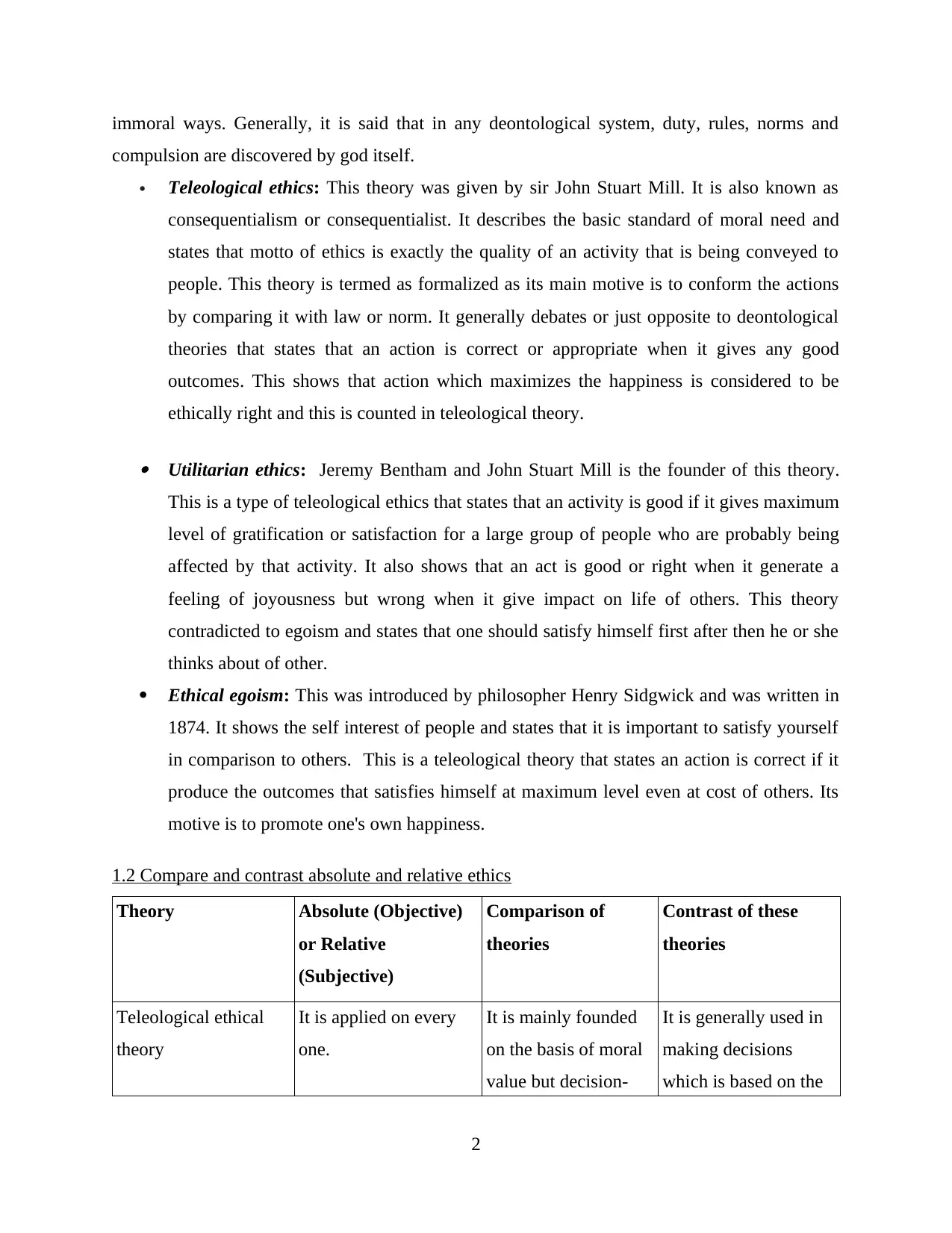
immoral ways. Generally, it is said that in any deontological system, duty, rules, norms and
compulsion are discovered by god itself.
Teleological ethics: This theory was given by sir John Stuart Mill. It is also known as
consequentialism or consequentialist. It describes the basic standard of moral need and
states that motto of ethics is exactly the quality of an activity that is being conveyed to
people. This theory is termed as formalized as its main motive is to conform the actions
by comparing it with law or norm. It generally debates or just opposite to deontological
theories that states that an action is correct or appropriate when it gives any good
outcomes. This shows that action which maximizes the happiness is considered to be
ethically right and this is counted in teleological theory.
Utilitarian ethics: Jeremy Bentham and John Stuart Mill is the founder of this theory.
This is a type of teleological ethics that states that an activity is good if it gives maximum
level of gratification or satisfaction for a large group of people who are probably being
affected by that activity. It also shows that an act is good or right when it generate a
feeling of joyousness but wrong when it give impact on life of others. This theory
contradicted to egoism and states that one should satisfy himself first after then he or she
thinks about of other.
Ethical egoism: This was introduced by philosopher Henry Sidgwick and was written in
1874. It shows the self interest of people and states that it is important to satisfy yourself
in comparison to others. This is a teleological theory that states an action is correct if it
produce the outcomes that satisfies himself at maximum level even at cost of others. Its
motive is to promote one's own happiness.
1.2 Compare and contrast absolute and relative ethics
Theory Absolute (Objective)
or Relative
(Subjective)
Comparison of
theories
Contrast of these
theories
Teleological ethical
theory
It is applied on every
one.
It is mainly founded
on the basis of moral
value but decision-
It is generally used in
making decisions
which is based on the
2
compulsion are discovered by god itself.
Teleological ethics: This theory was given by sir John Stuart Mill. It is also known as
consequentialism or consequentialist. It describes the basic standard of moral need and
states that motto of ethics is exactly the quality of an activity that is being conveyed to
people. This theory is termed as formalized as its main motive is to conform the actions
by comparing it with law or norm. It generally debates or just opposite to deontological
theories that states that an action is correct or appropriate when it gives any good
outcomes. This shows that action which maximizes the happiness is considered to be
ethically right and this is counted in teleological theory.
Utilitarian ethics: Jeremy Bentham and John Stuart Mill is the founder of this theory.
This is a type of teleological ethics that states that an activity is good if it gives maximum
level of gratification or satisfaction for a large group of people who are probably being
affected by that activity. It also shows that an act is good or right when it generate a
feeling of joyousness but wrong when it give impact on life of others. This theory
contradicted to egoism and states that one should satisfy himself first after then he or she
thinks about of other.
Ethical egoism: This was introduced by philosopher Henry Sidgwick and was written in
1874. It shows the self interest of people and states that it is important to satisfy yourself
in comparison to others. This is a teleological theory that states an action is correct if it
produce the outcomes that satisfies himself at maximum level even at cost of others. Its
motive is to promote one's own happiness.
1.2 Compare and contrast absolute and relative ethics
Theory Absolute (Objective)
or Relative
(Subjective)
Comparison of
theories
Contrast of these
theories
Teleological ethical
theory
It is applied on every
one.
It is mainly founded
on the basis of moral
value but decision-
It is generally used in
making decisions
which is based on the
2
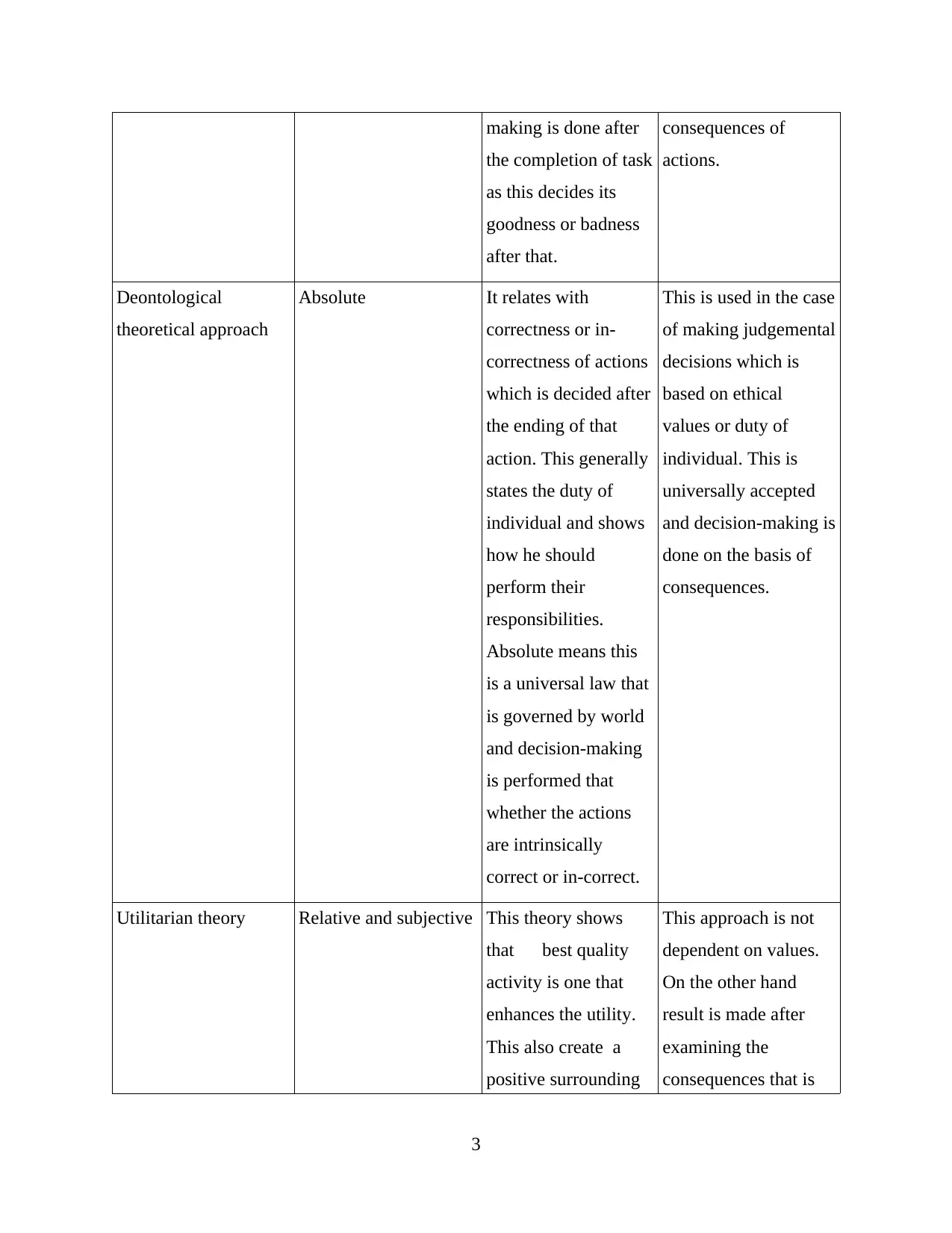
making is done after
the completion of task
as this decides its
goodness or badness
after that.
consequences of
actions.
Deontological
theoretical approach
Absolute It relates with
correctness or in-
correctness of actions
which is decided after
the ending of that
action. This generally
states the duty of
individual and shows
how he should
perform their
responsibilities.
Absolute means this
is a universal law that
is governed by world
and decision-making
is performed that
whether the actions
are intrinsically
correct or in-correct.
This is used in the case
of making judgemental
decisions which is
based on ethical
values or duty of
individual. This is
universally accepted
and decision-making is
done on the basis of
consequences.
Utilitarian theory Relative and subjective This theory shows
that best quality
activity is one that
enhances the utility.
This also create a
positive surrounding
This approach is not
dependent on values.
On the other hand
result is made after
examining the
consequences that is
3
the completion of task
as this decides its
goodness or badness
after that.
consequences of
actions.
Deontological
theoretical approach
Absolute It relates with
correctness or in-
correctness of actions
which is decided after
the ending of that
action. This generally
states the duty of
individual and shows
how he should
perform their
responsibilities.
Absolute means this
is a universal law that
is governed by world
and decision-making
is performed that
whether the actions
are intrinsically
correct or in-correct.
This is used in the case
of making judgemental
decisions which is
based on ethical
values or duty of
individual. This is
universally accepted
and decision-making is
done on the basis of
consequences.
Utilitarian theory Relative and subjective This theory shows
that best quality
activity is one that
enhances the utility.
This also create a
positive surrounding
This approach is not
dependent on values.
On the other hand
result is made after
examining the
consequences that is
3
⊘ This is a preview!⊘
Do you want full access?
Subscribe today to unlock all pages.

Trusted by 1+ million students worldwide
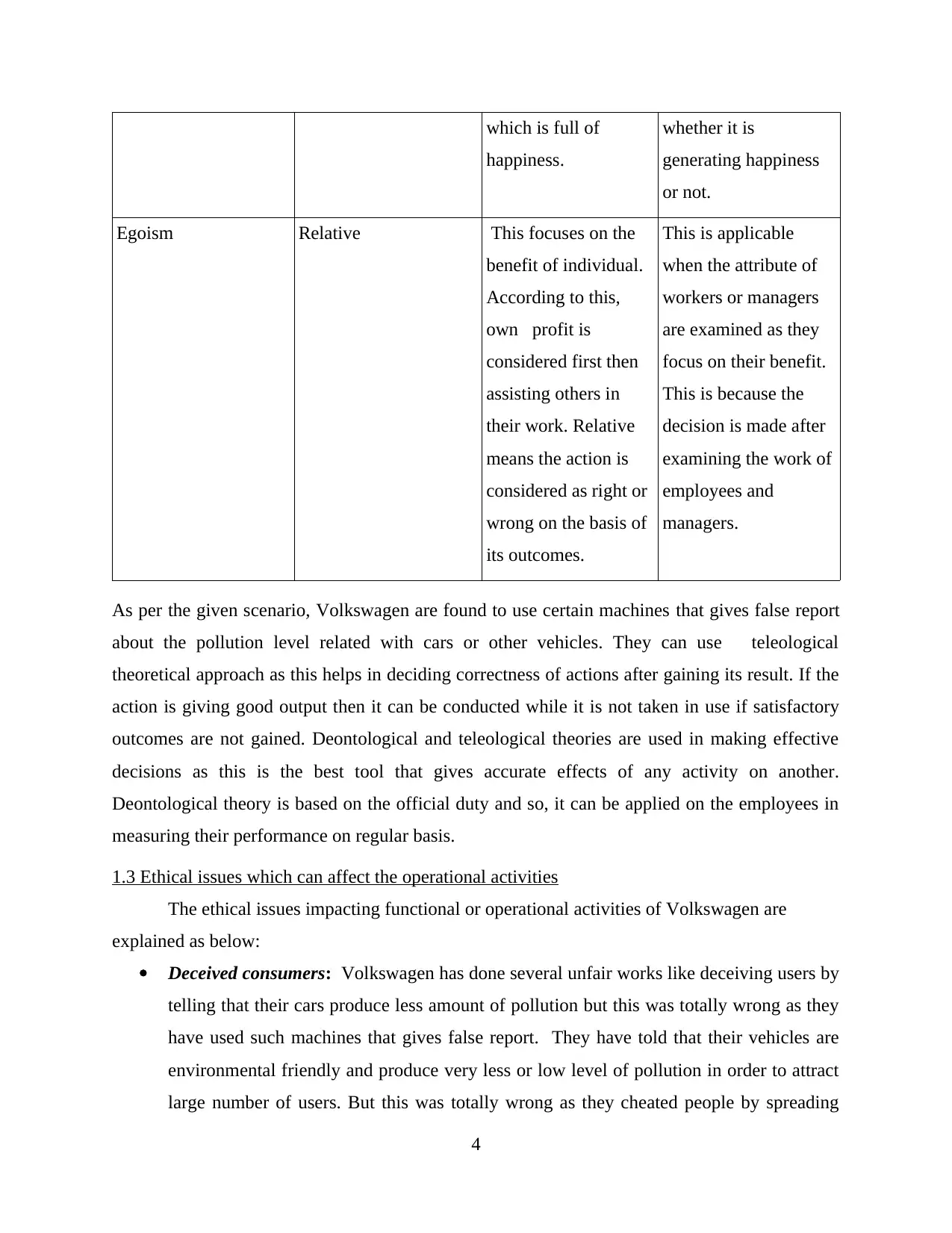
which is full of
happiness.
whether it is
generating happiness
or not.
Egoism Relative This focuses on the
benefit of individual.
According to this,
own profit is
considered first then
assisting others in
their work. Relative
means the action is
considered as right or
wrong on the basis of
its outcomes.
This is applicable
when the attribute of
workers or managers
are examined as they
focus on their benefit.
This is because the
decision is made after
examining the work of
employees and
managers.
As per the given scenario, Volkswagen are found to use certain machines that gives false report
about the pollution level related with cars or other vehicles. They can use teleological
theoretical approach as this helps in deciding correctness of actions after gaining its result. If the
action is giving good output then it can be conducted while it is not taken in use if satisfactory
outcomes are not gained. Deontological and teleological theories are used in making effective
decisions as this is the best tool that gives accurate effects of any activity on another.
Deontological theory is based on the official duty and so, it can be applied on the employees in
measuring their performance on regular basis.
1.3 Ethical issues which can affect the operational activities
The ethical issues impacting functional or operational activities of Volkswagen are
explained as below:
Deceived consumers: Volkswagen has done several unfair works like deceiving users by
telling that their cars produce less amount of pollution but this was totally wrong as they
have used such machines that gives false report. They have told that their vehicles are
environmental friendly and produce very less or low level of pollution in order to attract
large number of users. But this was totally wrong as they cheated people by spreading
4
happiness.
whether it is
generating happiness
or not.
Egoism Relative This focuses on the
benefit of individual.
According to this,
own profit is
considered first then
assisting others in
their work. Relative
means the action is
considered as right or
wrong on the basis of
its outcomes.
This is applicable
when the attribute of
workers or managers
are examined as they
focus on their benefit.
This is because the
decision is made after
examining the work of
employees and
managers.
As per the given scenario, Volkswagen are found to use certain machines that gives false report
about the pollution level related with cars or other vehicles. They can use teleological
theoretical approach as this helps in deciding correctness of actions after gaining its result. If the
action is giving good output then it can be conducted while it is not taken in use if satisfactory
outcomes are not gained. Deontological and teleological theories are used in making effective
decisions as this is the best tool that gives accurate effects of any activity on another.
Deontological theory is based on the official duty and so, it can be applied on the employees in
measuring their performance on regular basis.
1.3 Ethical issues which can affect the operational activities
The ethical issues impacting functional or operational activities of Volkswagen are
explained as below:
Deceived consumers: Volkswagen has done several unfair works like deceiving users by
telling that their cars produce less amount of pollution but this was totally wrong as they
have used such machines that gives false report. They have told that their vehicles are
environmental friendly and produce very less or low level of pollution in order to attract
large number of users. But this was totally wrong as they cheated people by spreading
4
Paraphrase This Document
Need a fresh take? Get an instant paraphrase of this document with our AI Paraphraser
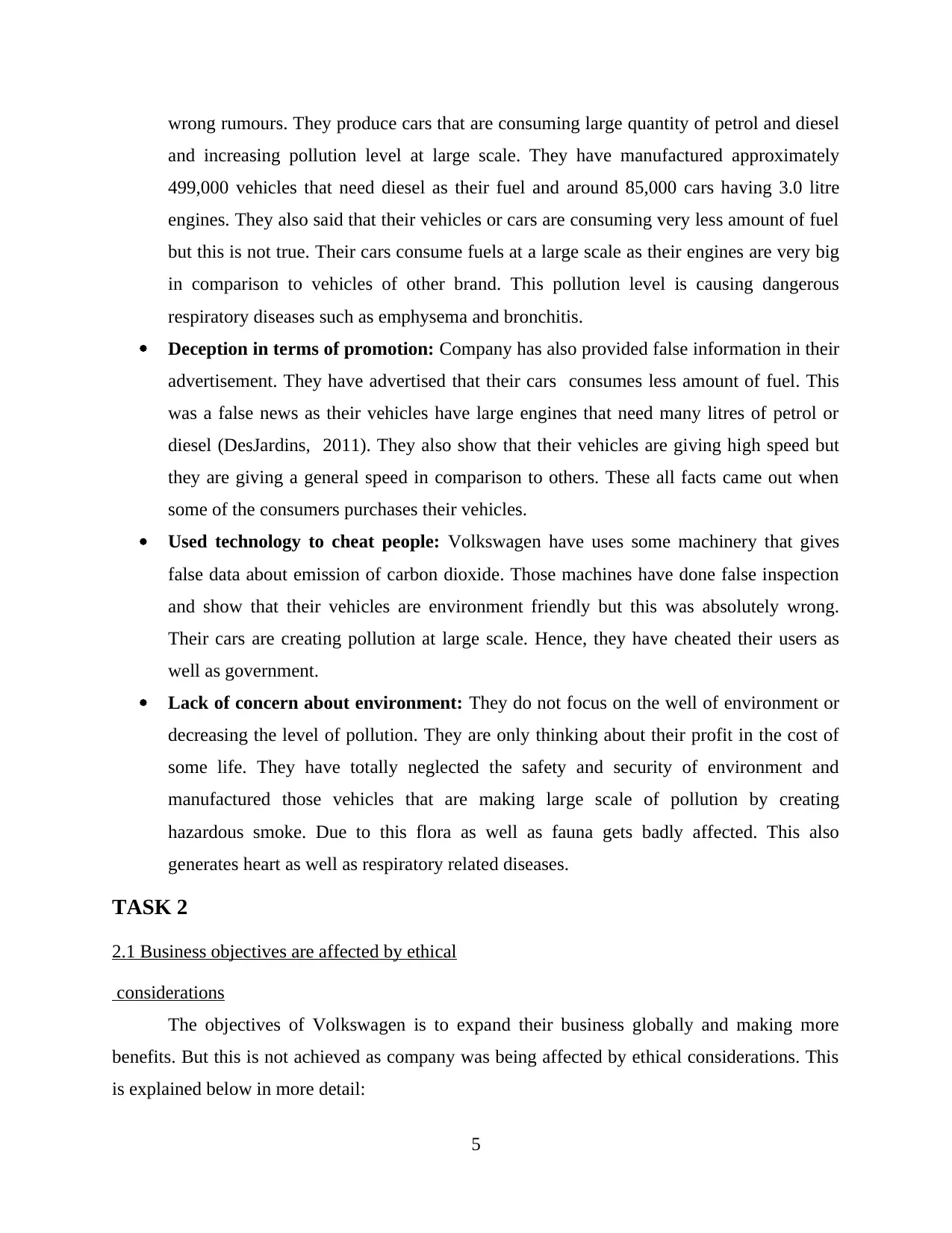
wrong rumours. They produce cars that are consuming large quantity of petrol and diesel
and increasing pollution level at large scale. They have manufactured approximately
499,000 vehicles that need diesel as their fuel and around 85,000 cars having 3.0 litre
engines. They also said that their vehicles or cars are consuming very less amount of fuel
but this is not true. Their cars consume fuels at a large scale as their engines are very big
in comparison to vehicles of other brand. This pollution level is causing dangerous
respiratory diseases such as emphysema and bronchitis.
Deception in terms of promotion: Company has also provided false information in their
advertisement. They have advertised that their cars consumes less amount of fuel. This
was a false news as their vehicles have large engines that need many litres of petrol or
diesel (DesJardins, 2011). They also show that their vehicles are giving high speed but
they are giving a general speed in comparison to others. These all facts came out when
some of the consumers purchases their vehicles.
Used technology to cheat people: Volkswagen have uses some machinery that gives
false data about emission of carbon dioxide. Those machines have done false inspection
and show that their vehicles are environment friendly but this was absolutely wrong.
Their cars are creating pollution at large scale. Hence, they have cheated their users as
well as government.
Lack of concern about environment: They do not focus on the well of environment or
decreasing the level of pollution. They are only thinking about their profit in the cost of
some life. They have totally neglected the safety and security of environment and
manufactured those vehicles that are making large scale of pollution by creating
hazardous smoke. Due to this flora as well as fauna gets badly affected. This also
generates heart as well as respiratory related diseases.
TASK 2
2.1 Business objectives are affected by ethical
considerations
The objectives of Volkswagen is to expand their business globally and making more
benefits. But this is not achieved as company was being affected by ethical considerations. This
is explained below in more detail:
5
and increasing pollution level at large scale. They have manufactured approximately
499,000 vehicles that need diesel as their fuel and around 85,000 cars having 3.0 litre
engines. They also said that their vehicles or cars are consuming very less amount of fuel
but this is not true. Their cars consume fuels at a large scale as their engines are very big
in comparison to vehicles of other brand. This pollution level is causing dangerous
respiratory diseases such as emphysema and bronchitis.
Deception in terms of promotion: Company has also provided false information in their
advertisement. They have advertised that their cars consumes less amount of fuel. This
was a false news as their vehicles have large engines that need many litres of petrol or
diesel (DesJardins, 2011). They also show that their vehicles are giving high speed but
they are giving a general speed in comparison to others. These all facts came out when
some of the consumers purchases their vehicles.
Used technology to cheat people: Volkswagen have uses some machinery that gives
false data about emission of carbon dioxide. Those machines have done false inspection
and show that their vehicles are environment friendly but this was absolutely wrong.
Their cars are creating pollution at large scale. Hence, they have cheated their users as
well as government.
Lack of concern about environment: They do not focus on the well of environment or
decreasing the level of pollution. They are only thinking about their profit in the cost of
some life. They have totally neglected the safety and security of environment and
manufactured those vehicles that are making large scale of pollution by creating
hazardous smoke. Due to this flora as well as fauna gets badly affected. This also
generates heart as well as respiratory related diseases.
TASK 2
2.1 Business objectives are affected by ethical
considerations
The objectives of Volkswagen is to expand their business globally and making more
benefits. But this is not achieved as company was being affected by ethical considerations. This
is explained below in more detail:
5
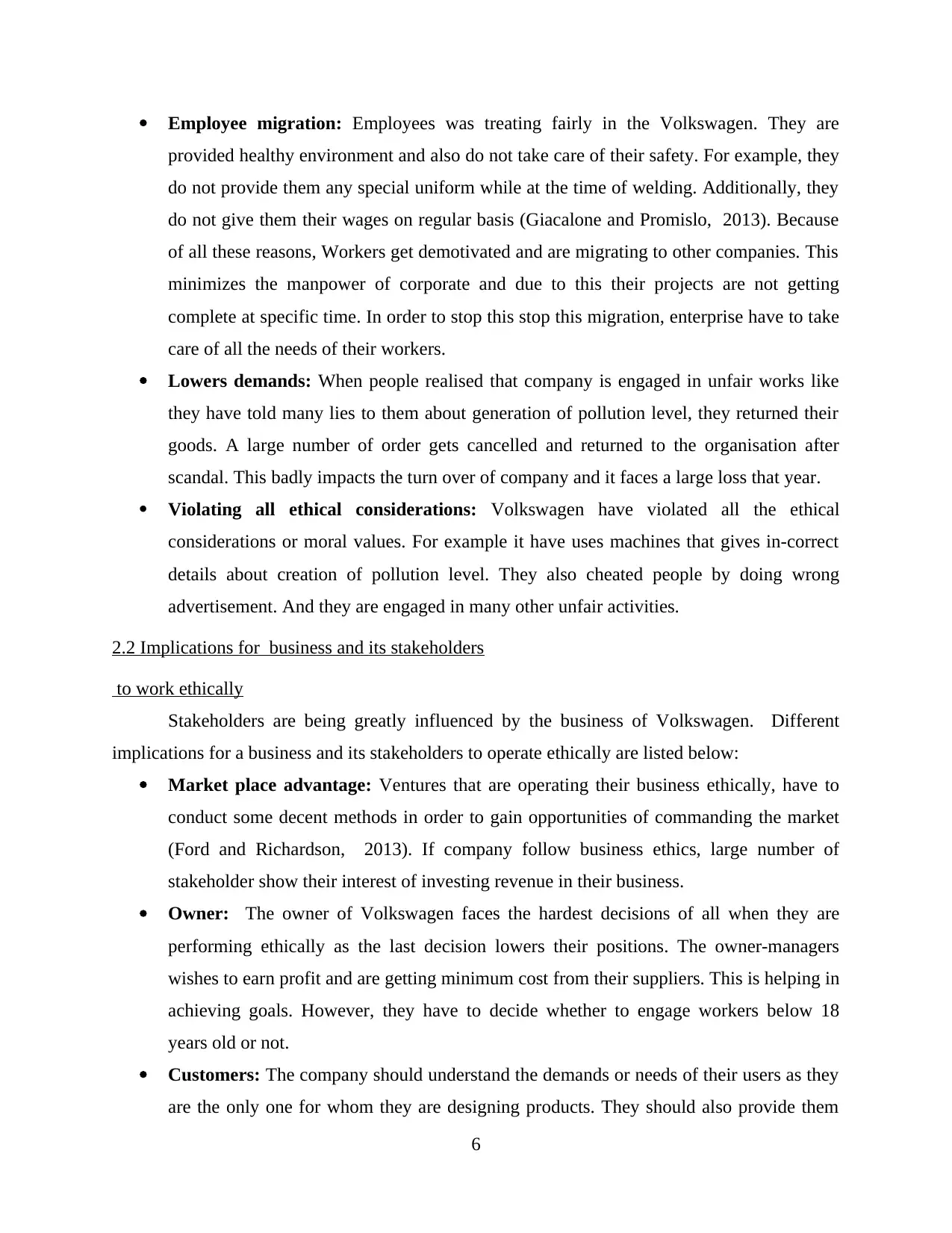
Employee migration: Employees was treating fairly in the Volkswagen. They are
provided healthy environment and also do not take care of their safety. For example, they
do not provide them any special uniform while at the time of welding. Additionally, they
do not give them their wages on regular basis (Giacalone and Promislo, 2013). Because
of all these reasons, Workers get demotivated and are migrating to other companies. This
minimizes the manpower of corporate and due to this their projects are not getting
complete at specific time. In order to stop this stop this migration, enterprise have to take
care of all the needs of their workers.
Lowers demands: When people realised that company is engaged in unfair works like
they have told many lies to them about generation of pollution level, they returned their
goods. A large number of order gets cancelled and returned to the organisation after
scandal. This badly impacts the turn over of company and it faces a large loss that year.
Violating all ethical considerations: Volkswagen have violated all the ethical
considerations or moral values. For example it have uses machines that gives in-correct
details about creation of pollution level. They also cheated people by doing wrong
advertisement. And they are engaged in many other unfair activities.
2.2 Implications for business and its stakeholders
to work ethically
Stakeholders are being greatly influenced by the business of Volkswagen. Different
implications for a business and its stakeholders to operate ethically are listed below:
Market place advantage: Ventures that are operating their business ethically, have to
conduct some decent methods in order to gain opportunities of commanding the market
(Ford and Richardson, 2013). If company follow business ethics, large number of
stakeholder show their interest of investing revenue in their business.
Owner: The owner of Volkswagen faces the hardest decisions of all when they are
performing ethically as the last decision lowers their positions. The owner-managers
wishes to earn profit and are getting minimum cost from their suppliers. This is helping in
achieving goals. However, they have to decide whether to engage workers below 18
years old or not.
Customers: The company should understand the demands or needs of their users as they
are the only one for whom they are designing products. They should also provide them
6
provided healthy environment and also do not take care of their safety. For example, they
do not provide them any special uniform while at the time of welding. Additionally, they
do not give them their wages on regular basis (Giacalone and Promislo, 2013). Because
of all these reasons, Workers get demotivated and are migrating to other companies. This
minimizes the manpower of corporate and due to this their projects are not getting
complete at specific time. In order to stop this stop this migration, enterprise have to take
care of all the needs of their workers.
Lowers demands: When people realised that company is engaged in unfair works like
they have told many lies to them about generation of pollution level, they returned their
goods. A large number of order gets cancelled and returned to the organisation after
scandal. This badly impacts the turn over of company and it faces a large loss that year.
Violating all ethical considerations: Volkswagen have violated all the ethical
considerations or moral values. For example it have uses machines that gives in-correct
details about creation of pollution level. They also cheated people by doing wrong
advertisement. And they are engaged in many other unfair activities.
2.2 Implications for business and its stakeholders
to work ethically
Stakeholders are being greatly influenced by the business of Volkswagen. Different
implications for a business and its stakeholders to operate ethically are listed below:
Market place advantage: Ventures that are operating their business ethically, have to
conduct some decent methods in order to gain opportunities of commanding the market
(Ford and Richardson, 2013). If company follow business ethics, large number of
stakeholder show their interest of investing revenue in their business.
Owner: The owner of Volkswagen faces the hardest decisions of all when they are
performing ethically as the last decision lowers their positions. The owner-managers
wishes to earn profit and are getting minimum cost from their suppliers. This is helping in
achieving goals. However, they have to decide whether to engage workers below 18
years old or not.
Customers: The company should understand the demands or needs of their users as they
are the only one for whom they are designing products. They should also provide them
6
⊘ This is a preview!⊘
Do you want full access?
Subscribe today to unlock all pages.

Trusted by 1+ million students worldwide
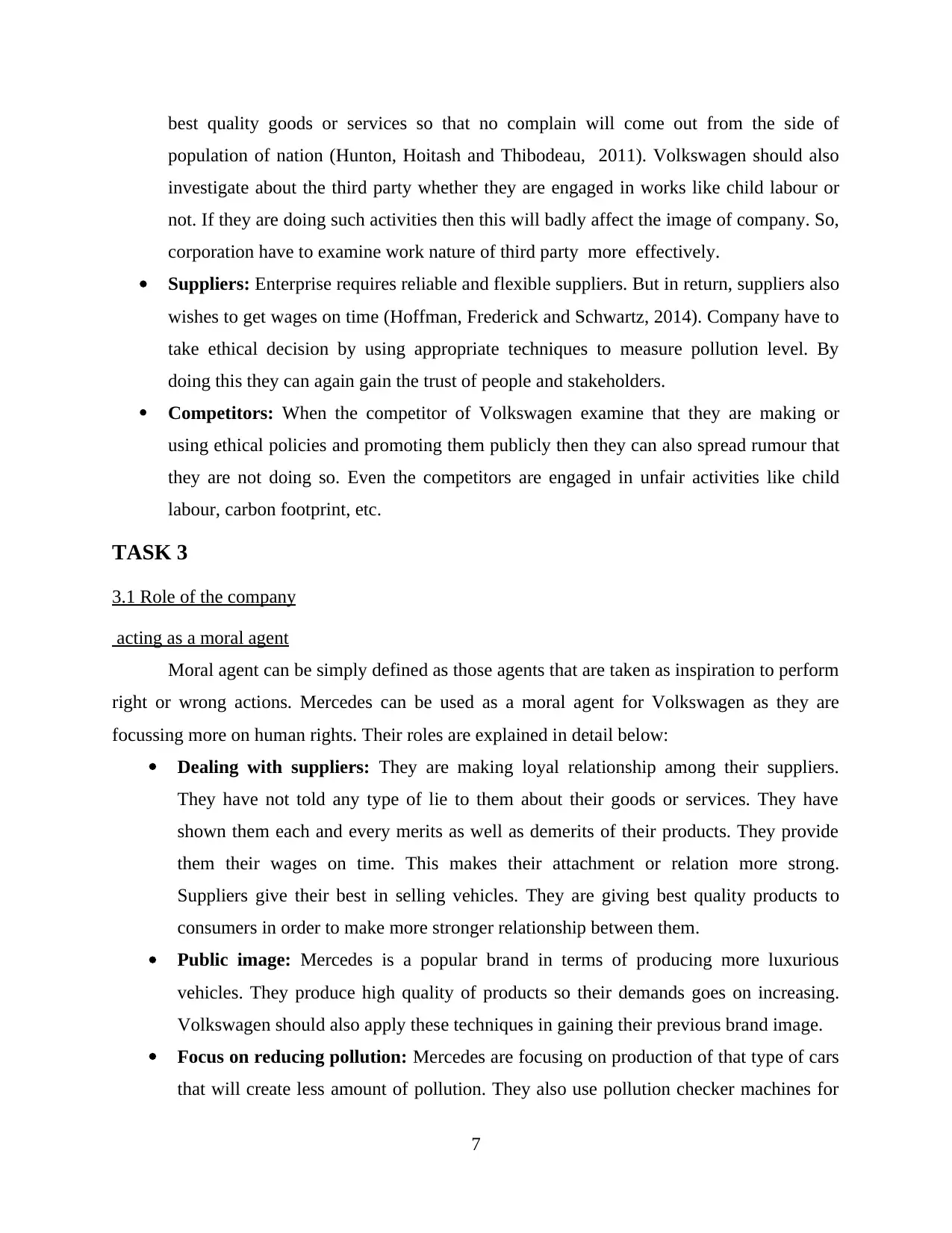
best quality goods or services so that no complain will come out from the side of
population of nation (Hunton, Hoitash and Thibodeau, 2011). Volkswagen should also
investigate about the third party whether they are engaged in works like child labour or
not. If they are doing such activities then this will badly affect the image of company. So,
corporation have to examine work nature of third party more effectively.
Suppliers: Enterprise requires reliable and flexible suppliers. But in return, suppliers also
wishes to get wages on time (Hoffman, Frederick and Schwartz, 2014). Company have to
take ethical decision by using appropriate techniques to measure pollution level. By
doing this they can again gain the trust of people and stakeholders.
Competitors: When the competitor of Volkswagen examine that they are making or
using ethical policies and promoting them publicly then they can also spread rumour that
they are not doing so. Even the competitors are engaged in unfair activities like child
labour, carbon footprint, etc.
TASK 3
3.1 Role of the company
acting as a moral agent
Moral agent can be simply defined as those agents that are taken as inspiration to perform
right or wrong actions. Mercedes can be used as a moral agent for Volkswagen as they are
focussing more on human rights. Their roles are explained in detail below:
Dealing with suppliers: They are making loyal relationship among their suppliers.
They have not told any type of lie to them about their goods or services. They have
shown them each and every merits as well as demerits of their products. They provide
them their wages on time. This makes their attachment or relation more strong.
Suppliers give their best in selling vehicles. They are giving best quality products to
consumers in order to make more stronger relationship between them.
Public image: Mercedes is a popular brand in terms of producing more luxurious
vehicles. They produce high quality of products so their demands goes on increasing.
Volkswagen should also apply these techniques in gaining their previous brand image.
Focus on reducing pollution: Mercedes are focusing on production of that type of cars
that will create less amount of pollution. They also use pollution checker machines for
7
population of nation (Hunton, Hoitash and Thibodeau, 2011). Volkswagen should also
investigate about the third party whether they are engaged in works like child labour or
not. If they are doing such activities then this will badly affect the image of company. So,
corporation have to examine work nature of third party more effectively.
Suppliers: Enterprise requires reliable and flexible suppliers. But in return, suppliers also
wishes to get wages on time (Hoffman, Frederick and Schwartz, 2014). Company have to
take ethical decision by using appropriate techniques to measure pollution level. By
doing this they can again gain the trust of people and stakeholders.
Competitors: When the competitor of Volkswagen examine that they are making or
using ethical policies and promoting them publicly then they can also spread rumour that
they are not doing so. Even the competitors are engaged in unfair activities like child
labour, carbon footprint, etc.
TASK 3
3.1 Role of the company
acting as a moral agent
Moral agent can be simply defined as those agents that are taken as inspiration to perform
right or wrong actions. Mercedes can be used as a moral agent for Volkswagen as they are
focussing more on human rights. Their roles are explained in detail below:
Dealing with suppliers: They are making loyal relationship among their suppliers.
They have not told any type of lie to them about their goods or services. They have
shown them each and every merits as well as demerits of their products. They provide
them their wages on time. This makes their attachment or relation more strong.
Suppliers give their best in selling vehicles. They are giving best quality products to
consumers in order to make more stronger relationship between them.
Public image: Mercedes is a popular brand in terms of producing more luxurious
vehicles. They produce high quality of products so their demands goes on increasing.
Volkswagen should also apply these techniques in gaining their previous brand image.
Focus on reducing pollution: Mercedes are focusing on production of that type of cars
that will create less amount of pollution. They also use pollution checker machines for
7
Paraphrase This Document
Need a fresh take? Get an instant paraphrase of this document with our AI Paraphraser
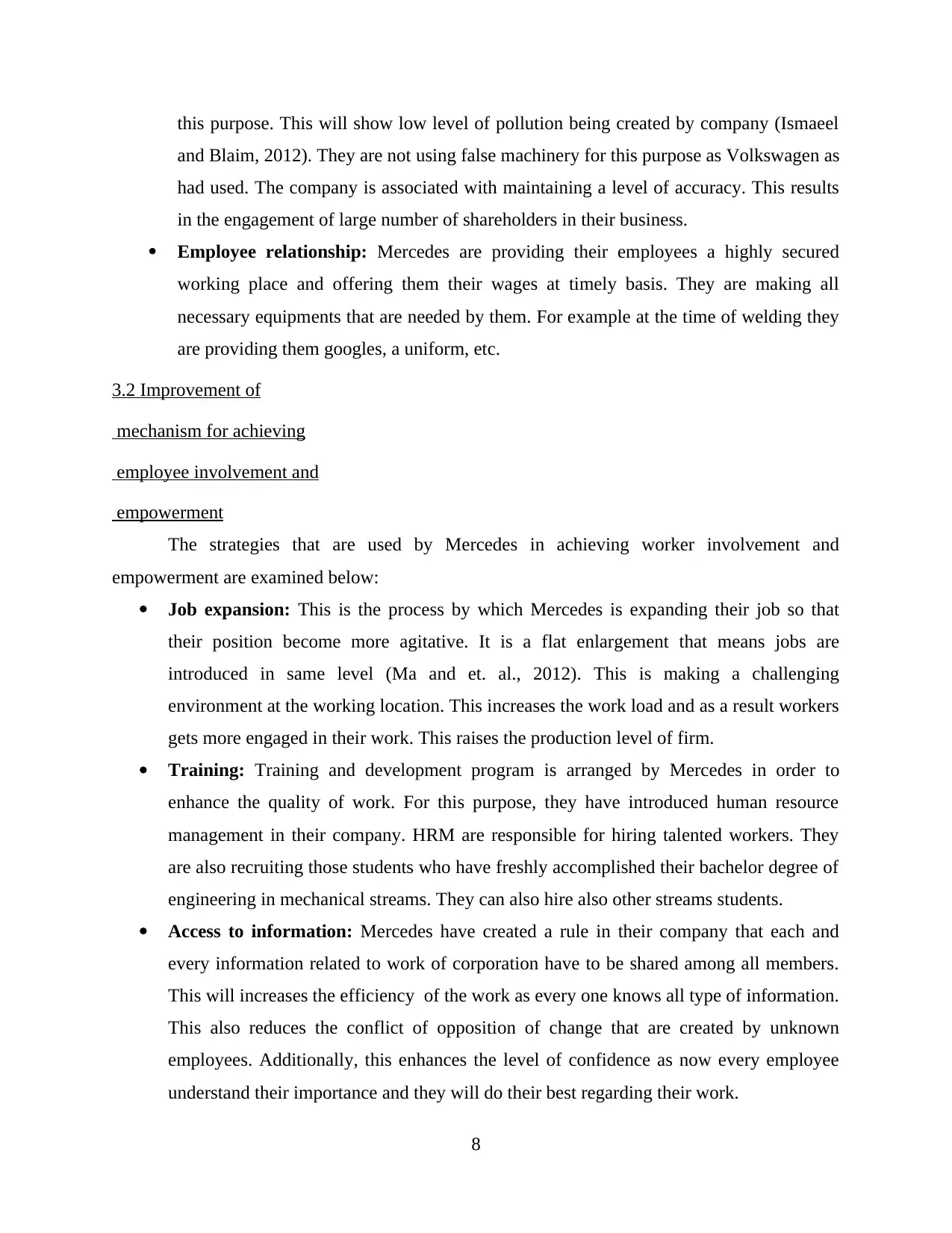
this purpose. This will show low level of pollution being created by company (Ismaeel
and Blaim, 2012). They are not using false machinery for this purpose as Volkswagen as
had used. The company is associated with maintaining a level of accuracy. This results
in the engagement of large number of shareholders in their business.
Employee relationship: Mercedes are providing their employees a highly secured
working place and offering them their wages at timely basis. They are making all
necessary equipments that are needed by them. For example at the time of welding they
are providing them googles, a uniform, etc.
3.2 Improvement of
mechanism for achieving
employee involvement and
empowerment
The strategies that are used by Mercedes in achieving worker involvement and
empowerment are examined below:
Job expansion: This is the process by which Mercedes is expanding their job so that
their position become more agitative. It is a flat enlargement that means jobs are
introduced in same level (Ma and et. al., 2012). This is making a challenging
environment at the working location. This increases the work load and as a result workers
gets more engaged in their work. This raises the production level of firm.
Training: Training and development program is arranged by Mercedes in order to
enhance the quality of work. For this purpose, they have introduced human resource
management in their company. HRM are responsible for hiring talented workers. They
are also recruiting those students who have freshly accomplished their bachelor degree of
engineering in mechanical streams. They can also hire also other streams students.
Access to information: Mercedes have created a rule in their company that each and
every information related to work of corporation have to be shared among all members.
This will increases the efficiency of the work as every one knows all type of information.
This also reduces the conflict of opposition of change that are created by unknown
employees. Additionally, this enhances the level of confidence as now every employee
understand their importance and they will do their best regarding their work.
8
and Blaim, 2012). They are not using false machinery for this purpose as Volkswagen as
had used. The company is associated with maintaining a level of accuracy. This results
in the engagement of large number of shareholders in their business.
Employee relationship: Mercedes are providing their employees a highly secured
working place and offering them their wages at timely basis. They are making all
necessary equipments that are needed by them. For example at the time of welding they
are providing them googles, a uniform, etc.
3.2 Improvement of
mechanism for achieving
employee involvement and
empowerment
The strategies that are used by Mercedes in achieving worker involvement and
empowerment are examined below:
Job expansion: This is the process by which Mercedes is expanding their job so that
their position become more agitative. It is a flat enlargement that means jobs are
introduced in same level (Ma and et. al., 2012). This is making a challenging
environment at the working location. This increases the work load and as a result workers
gets more engaged in their work. This raises the production level of firm.
Training: Training and development program is arranged by Mercedes in order to
enhance the quality of work. For this purpose, they have introduced human resource
management in their company. HRM are responsible for hiring talented workers. They
are also recruiting those students who have freshly accomplished their bachelor degree of
engineering in mechanical streams. They can also hire also other streams students.
Access to information: Mercedes have created a rule in their company that each and
every information related to work of corporation have to be shared among all members.
This will increases the efficiency of the work as every one knows all type of information.
This also reduces the conflict of opposition of change that are created by unknown
employees. Additionally, this enhances the level of confidence as now every employee
understand their importance and they will do their best regarding their work.
8
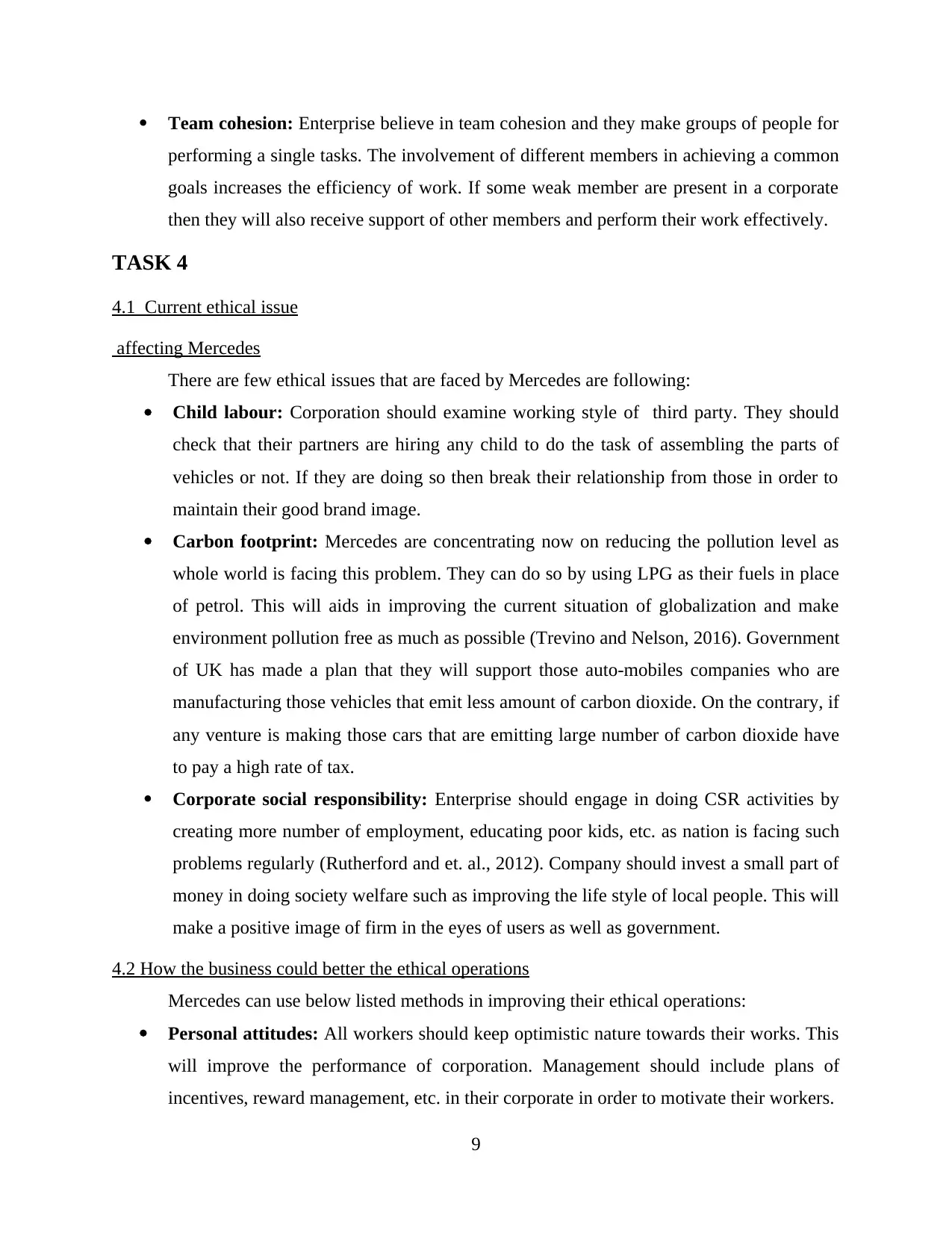
Team cohesion: Enterprise believe in team cohesion and they make groups of people for
performing a single tasks. The involvement of different members in achieving a common
goals increases the efficiency of work. If some weak member are present in a corporate
then they will also receive support of other members and perform their work effectively.
TASK 4
4.1 Current ethical issue
affecting Mercedes
There are few ethical issues that are faced by Mercedes are following:
Child labour: Corporation should examine working style of third party. They should
check that their partners are hiring any child to do the task of assembling the parts of
vehicles or not. If they are doing so then break their relationship from those in order to
maintain their good brand image.
Carbon footprint: Mercedes are concentrating now on reducing the pollution level as
whole world is facing this problem. They can do so by using LPG as their fuels in place
of petrol. This will aids in improving the current situation of globalization and make
environment pollution free as much as possible (Trevino and Nelson, 2016). Government
of UK has made a plan that they will support those auto-mobiles companies who are
manufacturing those vehicles that emit less amount of carbon dioxide. On the contrary, if
any venture is making those cars that are emitting large number of carbon dioxide have
to pay a high rate of tax.
Corporate social responsibility: Enterprise should engage in doing CSR activities by
creating more number of employment, educating poor kids, etc. as nation is facing such
problems regularly (Rutherford and et. al., 2012). Company should invest a small part of
money in doing society welfare such as improving the life style of local people. This will
make a positive image of firm in the eyes of users as well as government.
4.2 How the business could better the ethical operations
Mercedes can use below listed methods in improving their ethical operations:
Personal attitudes: All workers should keep optimistic nature towards their works. This
will improve the performance of corporation. Management should include plans of
incentives, reward management, etc. in their corporate in order to motivate their workers.
9
performing a single tasks. The involvement of different members in achieving a common
goals increases the efficiency of work. If some weak member are present in a corporate
then they will also receive support of other members and perform their work effectively.
TASK 4
4.1 Current ethical issue
affecting Mercedes
There are few ethical issues that are faced by Mercedes are following:
Child labour: Corporation should examine working style of third party. They should
check that their partners are hiring any child to do the task of assembling the parts of
vehicles or not. If they are doing so then break their relationship from those in order to
maintain their good brand image.
Carbon footprint: Mercedes are concentrating now on reducing the pollution level as
whole world is facing this problem. They can do so by using LPG as their fuels in place
of petrol. This will aids in improving the current situation of globalization and make
environment pollution free as much as possible (Trevino and Nelson, 2016). Government
of UK has made a plan that they will support those auto-mobiles companies who are
manufacturing those vehicles that emit less amount of carbon dioxide. On the contrary, if
any venture is making those cars that are emitting large number of carbon dioxide have
to pay a high rate of tax.
Corporate social responsibility: Enterprise should engage in doing CSR activities by
creating more number of employment, educating poor kids, etc. as nation is facing such
problems regularly (Rutherford and et. al., 2012). Company should invest a small part of
money in doing society welfare such as improving the life style of local people. This will
make a positive image of firm in the eyes of users as well as government.
4.2 How the business could better the ethical operations
Mercedes can use below listed methods in improving their ethical operations:
Personal attitudes: All workers should keep optimistic nature towards their works. This
will improve the performance of corporation. Management should include plans of
incentives, reward management, etc. in their corporate in order to motivate their workers.
9
⊘ This is a preview!⊘
Do you want full access?
Subscribe today to unlock all pages.

Trusted by 1+ million students worldwide
1 out of 15
Related Documents
Your All-in-One AI-Powered Toolkit for Academic Success.
+13062052269
info@desklib.com
Available 24*7 on WhatsApp / Email
![[object Object]](/_next/static/media/star-bottom.7253800d.svg)
Unlock your academic potential
Copyright © 2020–2025 A2Z Services. All Rights Reserved. Developed and managed by ZUCOL.





